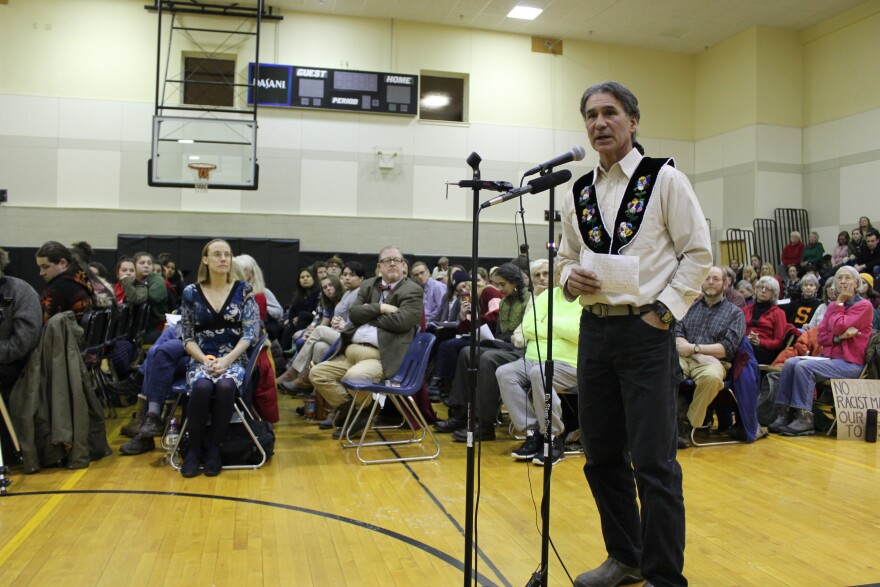There's a steady stream of travelers arriving at the Portland International Jetport on this Friday morning, including 76-year-old Kathleen Sullivan of Freeport.
She and a friend are about to board the first of three flights to reach the Greek island of Crete.
They'll first fly to Newark, where they'll catch a nine-hour flight to Athens. Then, it's on to Crete. She'll fly some 10,850 miles over the nine-day round trip.
This story is part of our series "Climate Driven: A deep dive into Maine's response, one county at a time."

The exact carbon impact of flights will vary depending on the time of day, season and type of aircraft, among other things.
Altogether, Sullivan's flights will emit about 3.2 metric tons of carbon per passenger, according to a calculator from the group Flight Free USA. That's twice the annual per person limit that scientists say is needed to contain global warming.
The flights from Newark to Athens and back, alone, are the equivalent of carpooling for nearly three years or being a vegetarian for more than five years, according to FlightFree USA. Nearly three billion people each emit less greenhouse gas than those flights’ 2.9 metric tons in one year.
Sullivan said she's excited about the adventure, but, she admits, the decision to go has weighed on her.
"Every time the opportunity to fly arrived at my doorstep, I thought there's no reason for me to fly," she said. "That's not important enough."
Sullivan, who helped found Freeport's climate action group a few years ago, said she never completely swore off flying. But she has avoided it in recent years.
Scientists say the carbon emissions from driving long distances are often comparable to those produced from some flights. But they say air travel is the single activity that produces the most carbon emissions per person at any one time.
Air travel accounts for nearly 4% of the world's carbon emissions, and frequent fliers, who make up only 1% of the world population, are responsible for half of those emissions, according to studies from multiple studies and the International Council on Clean Transportation.
"If you're rich enough to fly in the first place, then you're only part of the 20% of humans on Earth who have ever been on a plane," said Dan Castrigano of Vermont, a Flight Free USA organizer.
The group is the American chapter of a global non-profit that's urging people to give up flying. Thousands have signed pledges in the UK and Sweden. Three years ago, 444 Americans signed the petition, and the numbers have dipped since then as air travel began to rebound during the pandemic. Interest appears to have ticked up again, as the site has a total of 469 people who have taken the pledge so far this year.
For Castrigano, he stopped flying four years ago.
"It's a mindset shift, and I feel liberated and happy, because knowing about the climate emergency and the zero time we have left," he said.
Scientists have issued dire warnings year after year: The world must take drastic steps to reduce its reliance on fossil fuels to keep global warming to 1.5 degrees Celsius.

"For me, that's like, there's a fire," said Barry Dana, a former chief of the Penobscot Nation. "I feel a responsibility to my neighbor. There's a fire going toward their house. I run over there, right? And I've got a bottle of gasoline, or I have a bottle of water. Which am I going to put on it?"
Dana hasn't boarded a plane in more than 20 years out of concern for the environment. He remembers seeing clear blue skies, free of contrails, in the days after the Sept. 11 terrorist attacks when flights were grounded for a few days.
"That may have been the first time we used the term, 'essential flights only,'" Dana said. "I thought, 'I think that's where we need to be as a world, essential flights only.'"
When tribal business required him to travel, Dana took the train to Washington, D.C., which he jokes elicited some complaints from the other tribal members who went with him. He's only taken a few trips since his tenure as chief ended. An avid long-distance runner, he said he drove to the Boston Marathon and another time to Vermont to participate in a fundraising run.
Dana said he turned down two jobs that would have required frequent travel. And he and his wife, Lori, believe that flying should be limited to military and lifesaving flights. It's a decision, Dana acknowledges, that often sparks passionate responses on social media from his followers when he posts about it.
"Lori and I, we live a very simple, local life," he said. "We grow our own food. We hunt. We gather. But we’ve lived our life. We don’t need to go flying. We don’t need to party. We don’t need to run ultras in Spain or in the Alps. So we’ve committed ourselves, because we’ve listened to the science."
To offset, or not?
The aviation industry says it's taking steps to make air travel more climate-friendly. Many airlines offer so-called carbon offsets, programs that allow passengers to purchase credits for a small fee, to compensate for the carbon dioxide emitted during their flights. The fees fund projects, such as tree-planting programs, for example, that are supposed to reduce carbon in other areas.
Relatively few air passengers, about 1-3%, chose to purchase carbon offsets for their flights, according to the Air Transport Action Group, which represents the commercial aviation industry. And many, including NASA jet propulsion scientist Peter Kalmus, are deeply skeptical of carbon offset programs.
"Suppose the carbon offset is planting trees that are supposed to take up the same amount of carbon as what your flight emitted. If you can't prove that those trees are still going to be around, or your equivalent trees, 1,000 years from now, then that carbon offset is meaningless," says Kalmus, who started a forum called No Fly Climate Sci for academics and others who given up flying. "Carbon offsets are very much enabling business-as-usual."
Dana agrees.
"Grow all the lettuce you want," he said. "Walk to work if you want, and bike to work if you want. That’s all great stuff. But as soon as you take that flight you’re going to nullify it, and it’s not an offset. The carbon is in the air."
And though the aviation industry is developing sustainable jet fuels and other technology intended to make flying more efficient, Kalmus and others argue that widespread adoption will take too long. Plus, those technologies are expensive. The International Council on Clean Transportation suggests trillions of dollars in technological investments may be needed to reduce carbon emissions from air travel by 2050.

For some other climate-conscious Mainers, the decision to fly or not is less clear cut.
"There is a part of me that could say, 'well for God's sake, everybody else is flying,'" Sullivan said. "'I'm going to fly. How come I have to not to fly, you know, just because I'm conscious of this?'"
As she prepares for flight to Crete, Sullivan said she tries to live a low-carbon life. She's installed heat pumps and solar panels at her house. She's cut back on eating meat and avoids buying anything new. She acknowledges these are not major sacrifices but said she tries to think about the impact that her own everyday decisions will have on the planet.
But when her friend suggested they travel to Greece, Sullivan jumped at the chance. Part of the allure, she said, was reliving a trip that she and her friend had taken 30 years ago, when they were free of concerns about a rapidly warming planet.
"There was sense of endless nature, endless time," Sullivan said. "And we were younger as well. I think I wanted to get that feeling back."
As for Sullivan, she said her return flight to Maine in the coming days may be her last. But there's little indication that the anti-flying movement is taking off, at least in the U.S.
Air travel to and from Portland — and across the country — has nearly returned to pre-pandemic levels, jetport officials said. And the annual number of air passengers is projected to double by 2050.



